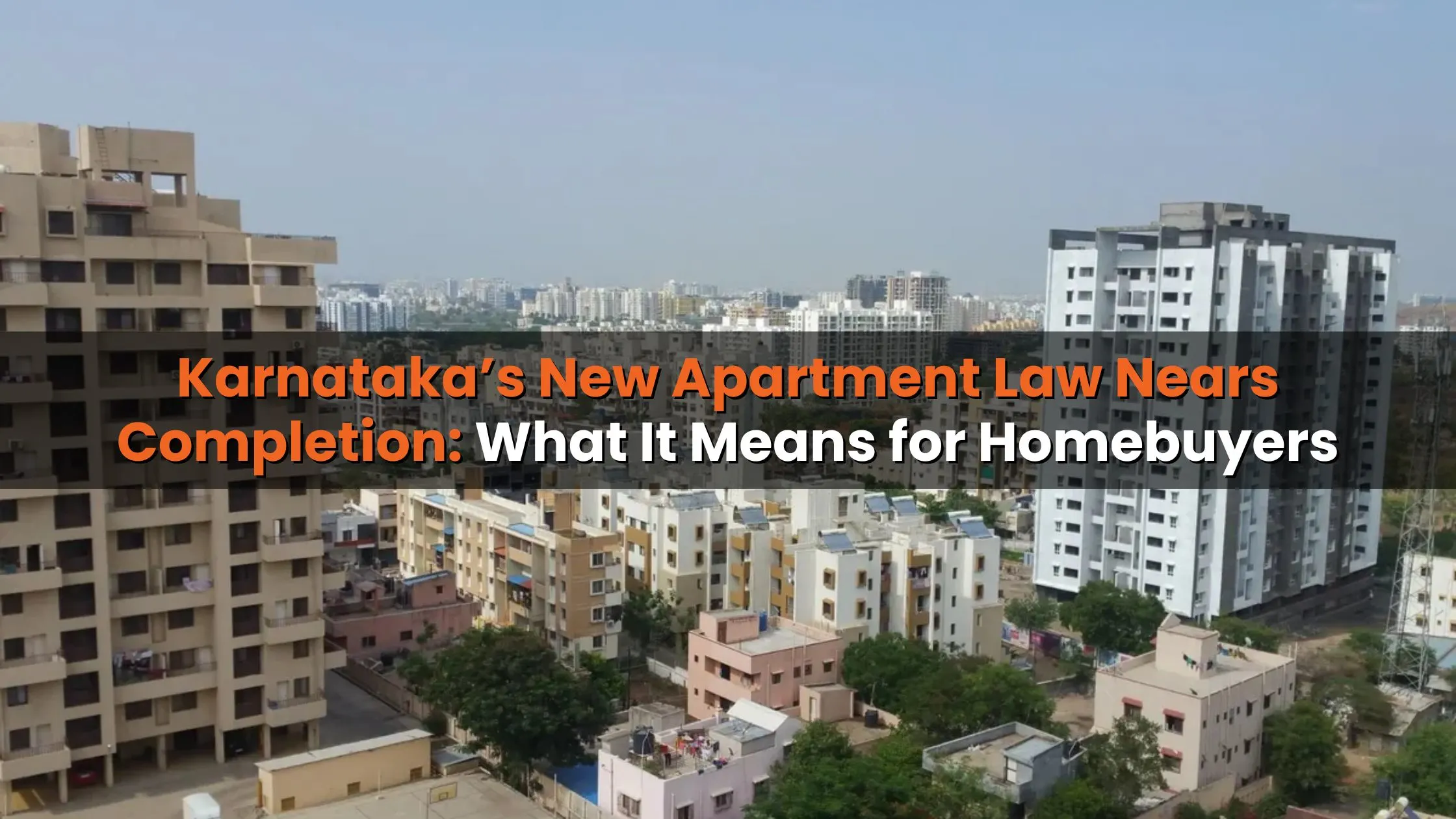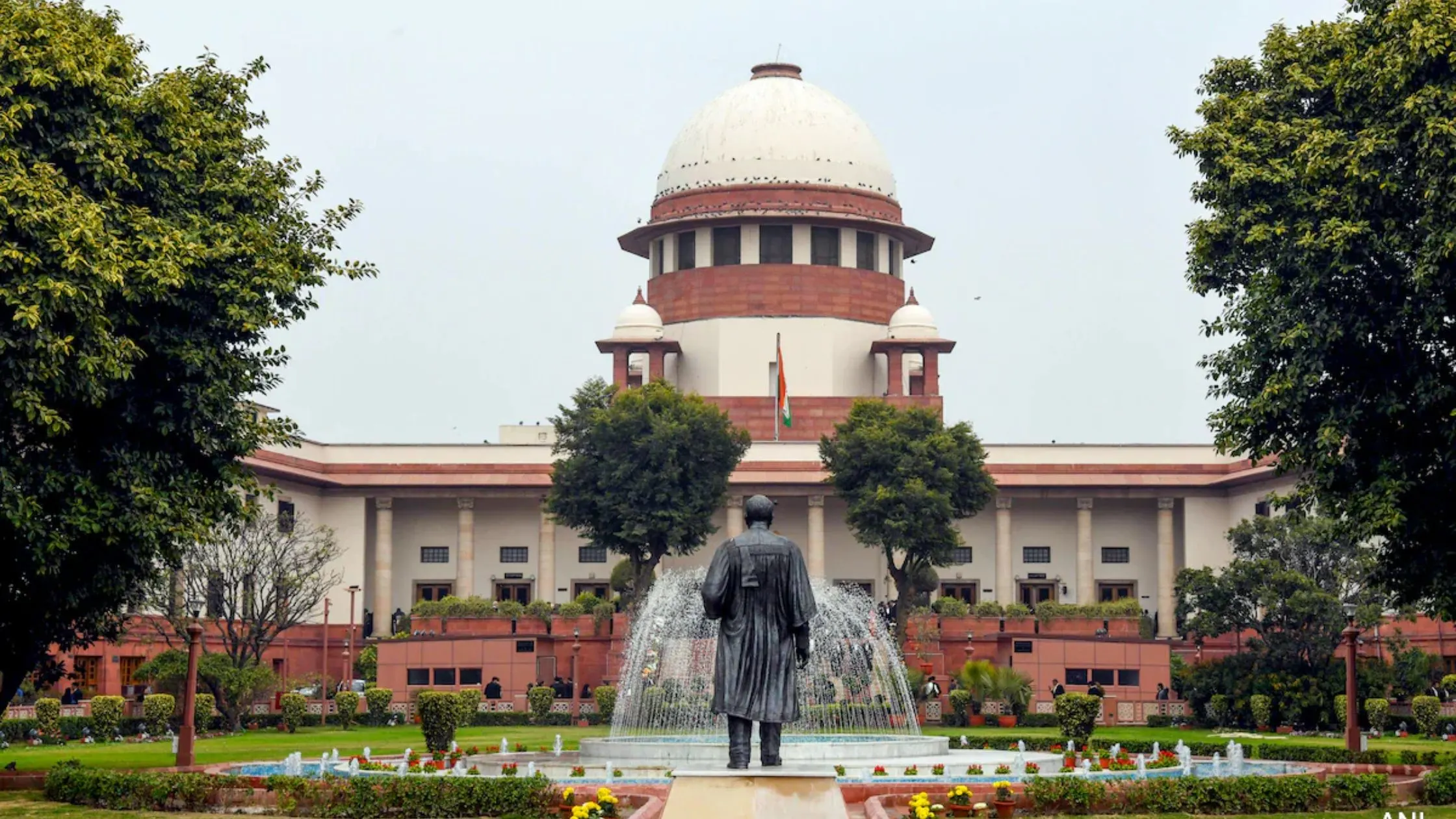Table of Content
▲
As Karnataka’s urban centres continue to grow, especially Bengaluru the need for updated apartment laws has never been more urgent. The state government is now in the final stages of drafting the Karnataka New Apartment Ownership Act, a modern legislative framework that aims to replace the outdated 1972 version and address long-standing concerns of homebuyers and apartment associations.
This much-anticipated reform promises to redefine how apartment ownership, maintenance, and governance function across the state.
Why Karnataka Is Overhauling Its Apartment Ownership Law
Apartment living was still in its infancy when the Karnataka Apartment Ownership Act was enacted in 1972. Fast forward to 2025, and vertical housing dominates the skyline of cities like Bengaluru. Yet, the legal framework has remained stuck in the past, creating ambiguity around issues like land rights, transfer of common areas, and the role of resident associations.
Deputy Chief Minister D.K. Shivakumar had earlier confirmed that a new law was being drafted under the purview of the RERA Act. The Karnataka New Apartment Ownership Act is now close to completion and will soon be presented for cabinet approval.
Also Read: Bengaluru Real Estate Sees Spike in ₹1–2 Cr Homes by Millennials
What the New Act Intends to Fix
The upcoming legislation seeks to provide clarity, structure, and enforceability in several critical areas:
- Automatic Transfer of Ownership: One of the key features expected is the automatic transfer of land, building, and common areas from builders to the Association of Allottees (AoA) within a fixed timeframe.
- Legal Backing for AoAs: Currently, many apartment communities struggle to form a legally recognised association due to procedural delays or lack of regulatory support. The new Act aims to simplify this process.
- Stronger Alignment with RERA: Section 17 of the RERA Act mandates the handover of common areas to the AoA, but implementation in Karnataka has been patchy. The new law is expected to fix this disconnect.
Demand for a Competent Authority
One of the strongest demands from citizen groups and homebuyer forums is the immediate appointment of a competent authority under the new law. This body will serve as the main regulatory and enforcement mechanism for the Karnataka New Apartment Ownership Act overseeing builder compliance, resolving disputes, and protecting the interests of homeowners.
Currently, the Registrar of Co-operative Societies is technically the competent authority under the old Act, but has limited jurisdiction and often refuses to take up housing-related grievances. The new framework will need to formally empower a dedicated body for real estate-specific governance.
Homebuyers Have Long Waited for Reform
Dhananjaya Padmanabhachar from the Karnataka Home Buyers Forum notes that a lack of legal clarity has pushed many apartment buyers to the courts for even basic relief. “We need a law that mandates the timely handover of all ownership rights and common areas. That’s the minimum a homeowner should expect,” he said.
Likewise, the Bangalore Apartments’ Federation (BAF) has urged the government to fast-track rulemaking and ensure enforcement mechanisms are in place. Without it, the Act risks becoming another well-intentioned document with little impact.
Legal Experts Welcome the Move
Legal professionals practicing before Karnataka’s Real Estate Regulatory Authority (KRERA) have also voiced support for the Karnataka New Apartment Ownership Act. Advocate Akash Bantia explains, “The existing 1972 law has major gaps. It was never built to manage the complexities of modern-day apartment living. The new Act is a much-needed reset.”
He adds that the law should clearly define obligations for builders and associations, introduce penalties for delays, and empower regulatory oversight.
What This Means for Apartment Owners
Once enacted, the Karnataka New Apartment Ownership Act could provide long-overdue relief to lakhs of apartment owners in the state. Here’s how:
- Simplified and legalised formation of housing associations
- Guaranteed timeline for handover of common areas
- Clarity in rights over land, amenities, and shared infrastructure
- Dedicated grievance redressal mechanism under a new authority
- Increased transparency in real estate transactions and governance
These changes will not only help apartment dwellers live with dignity and legal assurance but also boost trust in Karnataka’s real estate market.
Also Read: Guidance Value Karnataka: Understanding Revised Circle Rates Across Cities
What’s Next?
The draft of the Karnataka New Apartment Ownership Act is currently in its final review stage and will soon be presented to the state cabinet for approval. Once passed, it will undergo public notification and eventually replace the 1972 Act.
For residents, associations, and builders alike, this new law represents a major shift—one that could bring much-needed accountability, fairness, and order to apartment living in Karnataka.
Conclusion
The Karnataka New Apartment Ownership Act is more than just a legal reform; it’s a response to the realities of modern urban life. As thousands of families continue to make apartment communities their home, this law can lay the foundation for a more transparent, accountable, and fair housing ecosystem.
Whether you're a first-time homebuyer, a long-time resident, or part of a residents’ welfare association, this legislation could finally give you the clarity and protection you’ve been waiting for.
Follow AquireAcers Whatsapp Channel to Stay Updated With The Latest Real Estate News


_1770964981.webp)




_1770976628.webp)
Ans 1. It’s a new law being drafted to replace the outdated 1972 Apartment Ownership Act. The aim is to modernize rules around apartment ownership, common areas, and the role of resident associations in line with current real estate practices.
Ans 2. The 1972 law was created at a time when apartment living was rare. Today, with lakhs of people living in vertical housing, the old law lacks clarity on critical issues like transfer of land, formation of housing societies, and builder obligations.
Ans 3. The new law will likely mandate automatic transfer of land and common areas from builders to apartment associations, simplify the legal formation of such associations, and align Karnataka’s rules with national RERA norms for better enforcement.
Ans 4. Yes, one of the biggest demands is the appointment of a competent authority to handle disputes, enforce builder accountability, and oversee compliance. The current authority the Registrar of Co-operative Societies is seen as ineffective for housing matters.
Ans 5. Homeowners can expect a fixed timeline for receiving full ownership rights, greater legal clarity, and access to grievance redressal. Associations will be legally empowered and better able to manage their communities without facing delays from builders.
Ans 6. The draft has been finalized and is awaiting cabinet approval. Once cleared, it will be notified and eventually replace the existing 1972 legislation.
Ans 7. If implemented well, the new Act could build greater trust in the housing market, reduce litigation, and offer better protection for homebuyers. It’s a long-overdue reform that brings Karnataka in line with urban housing realities.
Ans 8. The old law simply doesn’t match the scale or complexity of today’s apartment living. With more people choosing vertical housing, issues like builder delays, unclear land rights, and lack of legal backing for associations needed urgent attention.